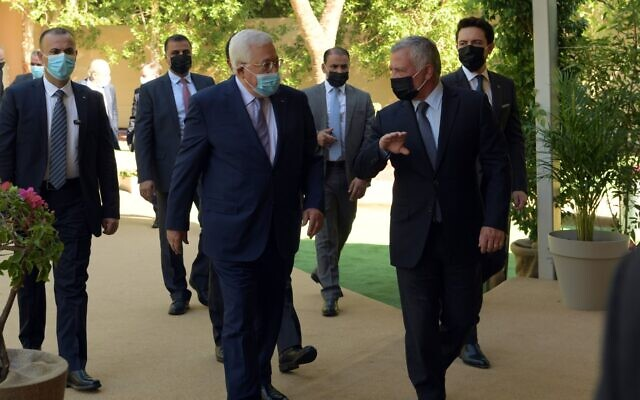
King Abdullah reaffirms support for two states in meeting with PA president, who will sit down with el-Sissi on Monday in trip following Ramallah’s renewed ties with Israel
Palestinian Authority President Mahmoud Abbas traveled to Jordan and then Egypt on Sunday to meet with the leaders of those countries in his first state trip in nearly ten months.
Abbas met with King Abdullah II in the southern Jordanian city of Aqaba to discuss “developments in the Palestinian sphere,” the Palestinian Authority presidential office said in a laconic statement.
“[Abbas] thanked the Jordanian monarch for his stances in support of the Palestinian position, and the rights of our people to freedom and independence,” Abbas’s office said.
Abdullah said in a statement that Jordan would resist “any attempt to change the identity” of Jerusalem on the ground and reaffirmed Jordan’s support for a two-state solution.
Senior Palestinian officials Hussein al-Sheikh and Majed Faraj also attended the meeting with the Jordanian monarch, according to the official PA news agency WAFA. The two are among Abbas’s closest advisors: al-Sheikh controls the powerful Civil Affairs Commission, which handles relations with Israel, while Faraj directs the Palestinian intelligence services.
Abbas left Jordan in the afternoon afternoon and traveled to Cairo, where he is scheduled to meet with Egyptian President Abdel Fattah El-Sissi on Monday.
The state visits are Abbas’s first since a February trip to the United Nations Security Council, where he condemned outgoing US President Donald Trump’s controversial peace plan.
The intervening months have been tumultuous — the coronavirus pandemic swept the globe; Israel normalized relations with three Arab states, dramatically shifting the regional order; the Israeli plan to annex parts of the West Bank was announced and subsequently suspended. The Palestinians increasingly found themselves diplomatically isolated and on the defensive.
Abbas’s meetings with fellow Arab leaders follow the resumption of coordination between Israel and the Palestinian Authority after nearly six months in which Ramallah publicly severed all ties between the two parties. The PA president cannot travel without approval by Israeli authorities.
While that annexation plan was shelved in August as part of the normalization accords with the United Arab Emirates, coordination between the Palestinian Authority and Israel did not resume until a week and a half ago.
The decision to restore ties came only a few days after the US presidential election was won by Democratic challenger Joe Biden, whom Ramallah anticipates will prove more sympathetic to their cause than outgoing President Donald Trump. The PA severed all ties with Trump administration three years ago in protest of its policies.
According to Abbas adviser Nabil Shaath, the coronavirus also played a large role in limiting his travel. Like many in the graying Palestinian leadership, the 84-year-old president is considered at risk for complications from the virus due to his advanced age and medical history.
“There have been a lot of restrictions even on his own meetings here, and the number of people allowed to meet him has been limited,” Shaath said in a phone call, before listing a number of senior officials in Ramallah who had been infected with the virus.
من لقاء اليوم الاحد ٢٩.١١.٢٠٢٠ ، فخامة الرئيس محمود عباس و جلالة الملك عبد الله الثاني في مدينة العقبة ،، بحضور معالي الوزير حسين الشيخ وسيادة اللواء ماجد فرج. pic.twitter.com/aQtGX6lAKc
— حسين الشيخ Hussein Al Sheikh (@HusseinSheikhpl) November 29, 2020A spokesperson for Abbas could not be reached for further comment on the timing of the trip.
While Jordan and Egypt have historically expressed support for the Palestinian cause, both also have signed peace treaties with Israel and work closely with Israel on regional issues.
Egypt enjoys especially tight security ties with Israel, as Cairo depends on the Jewish state to help contain a violent Islamist insurgency in northern Sinai. El-Sissi is also closely aligned with the United Arab Emirates and hailed Abu Dhabi’s decision to normalize ties with Israel in mid-August.
“I value the effort of those embarking upon this agreement for the sake of achieving prosperity and stability for our region,” el-Sissi said at the time.
Jordan was far more restrained in its praise, with Foreign Minister Ayman Safadi making no mention of the agreement on bilateral ties.
“The decision to freeze the annexation of Palestinian lands included in the agreement between the United Arab Emirates and Israel must be followed by Israel, stopping all illegal measures which undermine peace opportunities and its violations of Palestinian rights,” Safadi said.
 Eurasia Press & News
Eurasia Press & News



